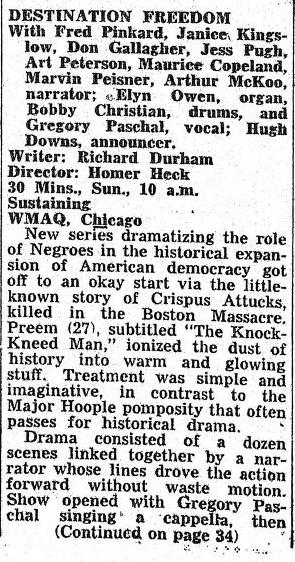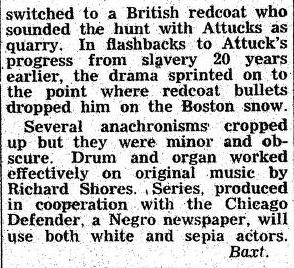Here’s a June 30, 1948 review of Richard Durham’s Destination: Freedom.



Here’s a June 30, 1948 review of Richard Durham’s Destination: Freedom.


Originally published in The Nostalgia Digest, Winter, 2013.
The most famous of Chicago’s black radio performers is unquestionably Richard Durham who was born in Raymond, MS, on September 6, 1917 but spent most of his childhood in Chicago. One source claims he studied first at Wilberforce and Central YMCA College before attending Northwestern University in suburban Chicago where he participated in the first NBC-Northwestern University summer radio institute in 1942. Some of Durham’s earliest writing work came as a dramatist with the WPA’s Writers Project and as national editor for the black newspaper The Chicago Defender.
Durham’s first known radio work was a weekly series entitled Democracy – USA, aired on Chicago’s WBBM beginning May 4, 1946. It was a fifteen-minute series of Sunday morning broadcasts that dramatized the life of prominent African Americans. Sixteen months later in September, 1947 while Democracy – USA was still on the air, Durham’s second effort, Here Comes Tomorrow, premiered on WJJD. Considered the first black soap opera, this story followed the Redmond family and their son, Milton, who returned home with amnesia after fighting in Italy during World War II. Both Democracy – USA and Here Comes Tomorrow went off the air in the spring of 1948.
Destination Freedom, Richard Durham’s most enduring radio legacy, debuted June 27, 1948 over WMAQ. The basic premise of Destination Freedom, dramatizing the lives of individuals of African descent and prominent events in black history, was an extension of his original work Democracy – USA. Destination Freedom ran for two years, an impressive run for a program that never attracted a commercial sponsor, was not picked up by a network, and focused on the interests of African Americans. In 1956, six years after the program left the air, Durham filed suit against NBC for $250,000 claiming the network had continued to air episodes in the years since he had left despite his claims to all copyrights concerning the show.
The extent of Durham’s post-WMAQ writing is less clear. In a 1983 interview with John Dunning, Durham recalled leaving Destination Freedom to work on the Irna Phillips show What’s New? starring Don Ameci. According to Durham, the pay differential between the sustained Destination Freedom and a sponsored Phillips work was too much to pass up. He also commented in the same interview that frequently his name was not associated with scripts in order to avoid causing problems with Southern sponsors. One other known Durham script was the August 31, 1957, episode of CBS Radio Workshop which featured a story concerning Denmark Vesey, a slave who led an uprising in 1821. Vesey had been the subject of Destination Freedom on its July 18, 1948, broadcast. The extent of Durham’s radio writing may never be fully realized.
During the 1950s Durham worked for the Packinghouse Workers’ Union doing publicity and in 1958 served as the press agent for GOP Congressional candidate Dr. T. R. Howard. He followed these jobs with an editorship at Muhammad Speaks through most of the 1960s. In 1969, while he continued to work for Muhammad Speaks, Durham returned to writing for the electronic media. He was hired to script Bird of the Iron Feather (originally called More From My Life), an African American soap opera set in the Chicago ghetto that was broadcast over WTTW, Chicago’s public television station, beginning in January, 1970. Bill Quinn, assistant writer at Playboy, worked as an associate writer on the project. The effort lasted just seven weeks before going off the air due to a premature and unexplained disappearance of funds. In the late 1970s Durham worked with Mohammad Ali on the boxer’s autobiography which was released in 1977. Richard Durham passed away April 27, 1984, and was inducted into the National Radio Hall of Fame in August, 2007.
About the time that Richard Durham was hitting his stride with Destination Freedom, Vernon Jarrett and Oscar Brown, Jr., were teaming up on Negro Newsfront, a daily fifteen -minute radio news program broadcast over Chicago’s WJJD. Though historical records indicate the news show aired from 1948 to 1951, in a 1996 interview Brown recalled airing the newscasts from 1947 to 1952. Thus, it’s possible Jarrett was not involved with Negro Newsfront during its entire run on radio. A native of Tennessee, Jarrett made his career as a journalist in Chicago, first with The Chicago Defender beginning in 1946 then later with The Chicago Tribune and The Chicago Sun-Times. He provided news for Chicago-area television as well. Jarrett died May 24, 2004. The first known black news program in Chicago, Negro Newsfront was also one of the first African American radio newscasts in the country. Oscar Brown, Jr., claimed to have started the show in 1947 over WJJD, and subsequently took it to WVON then WHFC.
One final program of interest was created to promote local black talent. The Chicago Defender and station WBBM teamed up to sponsor Star Quest, a contest for amateur performers, a concept which transitioned easily to television and remains popular to this day. Star Quest (referred to as Star-Questers on at least one occasion) seems to have run just a few weeks from March to May of 1947 on Tuesdays and Thursdays. Finalists were chosen from each broadcast who then competed for the grand prize, a thirteen-week contract on WBBM which paid $100 a week. Over 450 men and women auditioned for Star Quest and some of the finalists included Harriet Clemons, Delores Baker, James Hampton, Gladys Beaman and Ira Burton but the grand prize winner is unknown.
By the late 1940s the black drama and variety programs of Cooper and Durham were waning and disc jockeys were taking their place. Some of Chicago’s first record spinners – beyond Jack Cooper himself – included Al Benson and Eddie Honesty both of whom had long radio careers.
Never representing more than a tiny fraction of the programming going out on Chicago’s airwaves, these pioneering African Americans, from Jack Cooper to Richard Durham to Oscar Brown, Jr., carved out a space where the city’s black citizens could listen to music, news, and serious drama created specifically about and for them.
The material in this article was adapted from entries in Ryan Ellett’s book Encyclopedia of Black Radio in the United States, 1921-1955, published by McFarland Press in 2011 and available on their website www.mcfarlandpub.com.